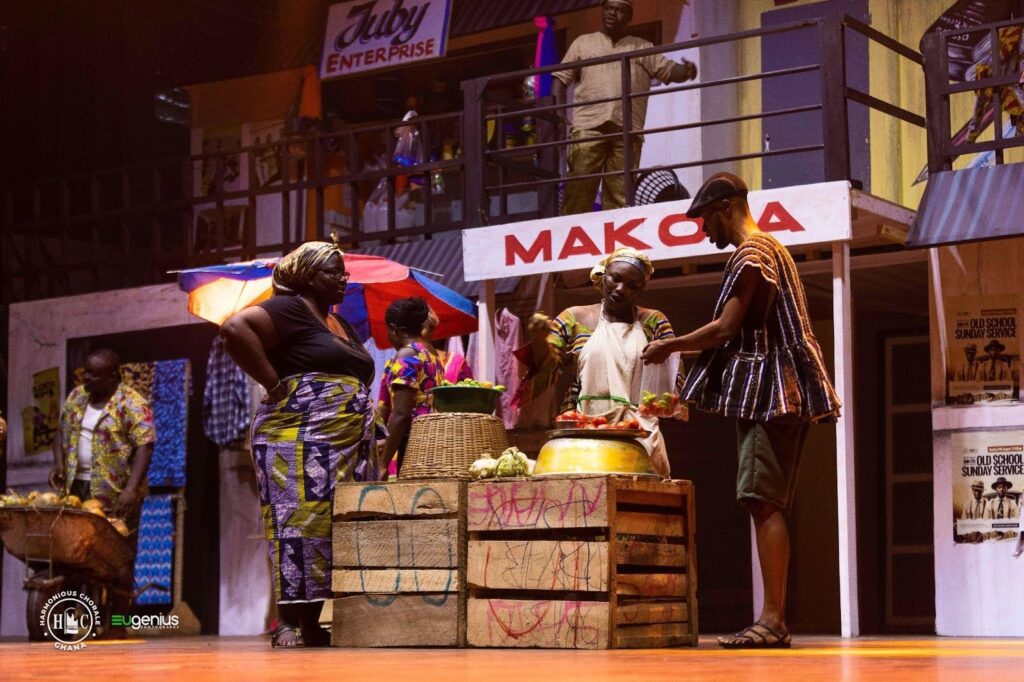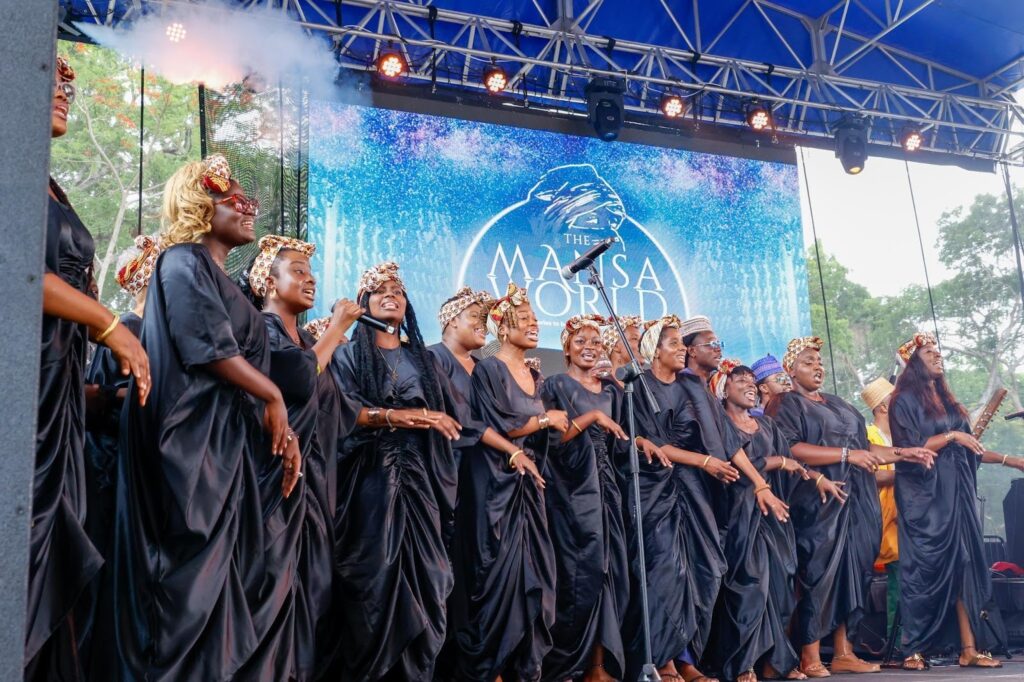By Kwame Aidoo, Ghana
Makola Queens and Mansa Musa and the Trail of Lost Gold: The Prelude; two Ghanaian theatre projects based on historical storytelling, are pushing the envelope by reimagining and telling the stories that we did not know we needed in the now. Inspired by the intricate history of oral traditions and social commentary, and immersed in multidisciplinary elements like music, fashion and dance, some of the current contemporary theatre productions from Ghana come with elaborate sets and large-scale cast and crew.

From a Makola Queens scene. By Eugenius Photography

From a Makola Queens scene. By Eugenius Photography
Makola Queens does not only tell the story of Rebecca Naa Dedei Aryeetey and other market women whose collective sacrifices financed, mobilized, and moved Ghana to independence, but recounts the political climate of the pre and post-independence era and the complications around the creation of the new nation’s identity. “Most accounts of Naa Dedei focus on her as an individual figure, but our vision was to place her in her truest context: as part of a community of women who raised her, worked alongside her, and rooted their power in solidarity,” explains Ama Asantewa Diaka.

From a Makola Queens scene. By Eugenius Photography
Diaka is one of the duo who wrote and produced Makola Queens. The artist believes that using theatre in this format is even more so promising since the performance art form can be an absolutely significant vessel for discussing history by presenting a visceral and memorable access point for digging into the past. Diaka’s collaborating partner is Nii Dromo; a 2D animator and vocal coach. Makola Queens’ opening scene recalls the 1979 destruction of Makola market by the late ex President Rawlings. Another epic scene is that of the 1948 shooting of ex-servicemen by the British leading to a depiction of how Naa Dedei rallied support behind Nkrumah, who would become the first president of Ghana.

From a Mansa Musa and The Trail of Lost Gold, The Prelude scene. Courtesy BambuCentre
Another theatre piece flourishing on stages around the globe is Mansa Musa and the Trail of Lost Gold, The Prelude – a Chief Moomen original. The performance piece highlights the immensely wealthy and powerful empires who exclusively controlled the regional gold trading networks with strategic mapping spanning from the upper Niger River area through thousands of miles across the continent. In Mansa Musa’s time, the 14th-century ruler of the West African Mali Empire, oversaw the exchange of minerals for vital commodities like salt, textiles, and horses from North Africa. A fictional bit ropes in a band of young adventurers who travel back in time in search of legendary lost gold.

From a Mansa Musa and The Trail of Lost Gold, The Prelude scene. Courtesy BambuCentre
The director Chief Moomen revealed the importance of merging African and diasporan voices to tell stories, when he brought together a remarkable cast and crew of 150 people: a collaboration between the original Ghanaian cast and talented Barbadian actors, at two sold out shows at Carifesta, Barbados. The most recent showcase of Mansa Musa and the Trail of Lost Gold, The Prelude was in Cairo with an 80 cast and crew ensemble from Ghana to mark the departure of the outgoing president of African Export Import Bank – Afreximbank, Dr. Benedict Okey Oramah and to welcome his replacement Dr. George Elombi.

From a Mansa Musa and The Trail of Lost Gold, The Prelude scene. Courtesy BambuCentre
Both Mansa Musa and the Trail of Lost Gold, The Prelude and Makola Queens bring to light forgotten pioneers, cultural practices, and monumental histories in Africa, reminding us of the toils and successes of previous generations. The two theatre projects strategically study past events, intimating the importance of cultural memory and identity in unravelling tangible and intangible legacies and ideas.
Editor’s Note

Kwame Aidoo is a Ghanaian writer whose work has been featured in ArtReview, StirWorld, Something We Africans Got, and more. In this feature, he captures how Ghanaian theatre is reclaiming the continent’s narratives — weaving heritage, music, and storytelling into powerful performances that connect Africa and its diaspora.He reminds us that preserving culture through performance is not just remembrance, but a living dialogue — an act of resistance and renewal; one that keeps our histories visible, our voices resonant, and our creativity boundless. As Ghanaian theatre reclaims voices long silenced, it challenges all of us to support and invest in the spaces where history, art, and identity intersect, to help shape the future of how Africa tells its own story.
